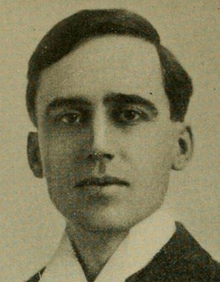William Melville Martin
| William Melville Martin | |
|---|---|
 |
|
| 2nd Premier of Saskatchewan | |
|
In office October 20, 1916 – April 5, 1922 |
|
| Monarch | George V |
| Lieutenant Governor |
Richard Stuart Lake Henry William Newlands |
| Preceded by | Thomas Walter Scott |
| Succeeded by | Charles Avery Dunning |
| Member of the Legislative Assembly of Saskatchewan for Regina City | |
|
In office November 13, 1916 – April 22, 1922 |
|
| Preceded by | James Franklin Bole |
| Succeeded by | James Albert Cross |
| Member of the Canadian Parliament for Regina |
|
|
In office October 26, 1908 – November 13, 1916 |
|
| Preceded by | District was created in 1907 |
| Succeeded by | Walter Davy Cowan |
| Personal details | |
| Born |
August 23, 1876 Norwich, Ontario |
| Died | June 22, 1970 (aged 93) Regina, Saskatchewan |
| Nationality | Canadian |
| Political party | Liberal Party of Canada |
| Other political affiliations |
Saskatchewan Liberal Party |
| Spouse(s) | Violette Florence Thomason |
| Religion | Presbyterian |
William Melville Martin (August 23, 1876 – June 22, 1970) served as the second Premier of the Canadian province of Saskatchewan from 1916 to 1922.
Martin was elected to the House of Commons for Regina in the 1908 Canadian federal election, and re-elected in 1911. In 1916, he entered provincial politics to take over the leadership of the Saskatchewan Liberal Party and become Premier. Martin, an outsider to provincial politics, was chosen by the Liberals in order to help distance them from allegations of corruption. Martin brought farmers' advocate Charles A. Dunning into the cabinet in an attempt to revitalise the Liberals, and instituted reforms to clean up the government. These changes were successful in cleansing the government's image, and Martin led the government to re-election in the 1917 election, winning 51 of 59 seats.
The United Farmers and Progressive movements were riding a national wave of agrarian discontent which undercut the Liberals across Canada, and threatened to engulf the Saskatchewan Liberals as well. Martin successfully attempted to embrace the populist movement by, in 1920, severing ties with the federal Liberal Party of Canada bringing in Dunning and also by recruiting another farm leader, federal Progressive MP John Archibald Maharg, into the government. The Liberals were able to resist the Progressive challenge in the 1921 election, which returned 46 Liberals to 6 Progressives, 7 Independents, 1 Labour MLA and 3 Conservatives.
...
Wikipedia
